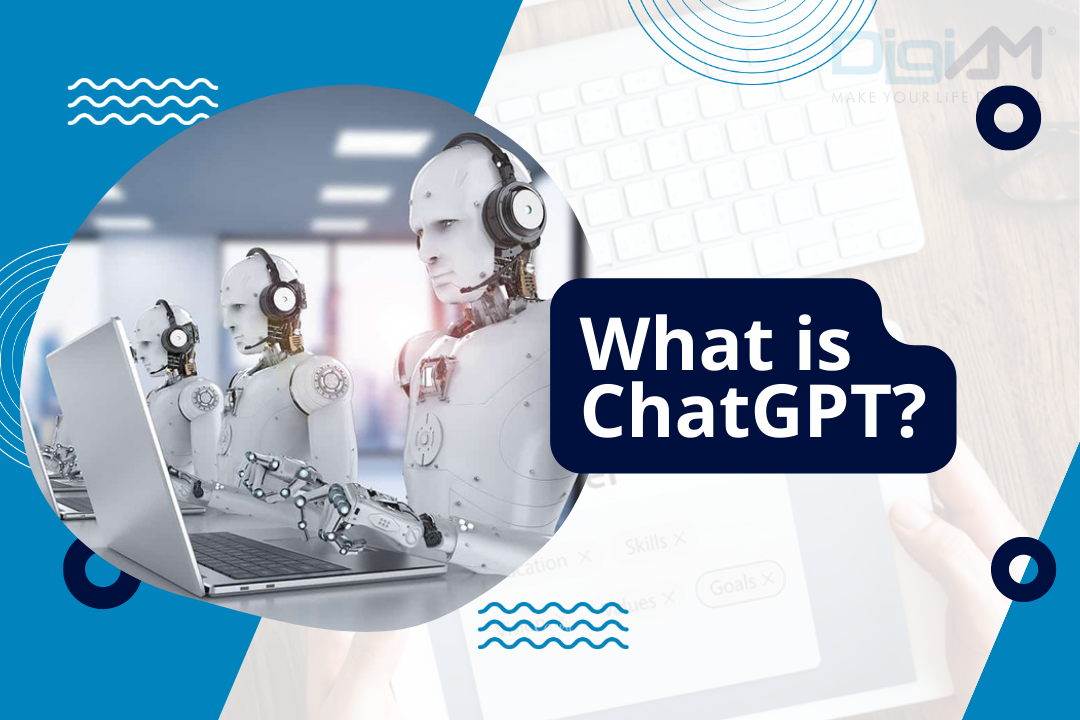What is ChatGPT | Future & Benefits of ChatGPT Chatbot?

ChatGPT is an AI chatbot that answers our questions easily and in many ways like an assistant. It is a type of virtual assistant for text-based conversations and has been trained on a large dataset of text from the internet to generate human-like responses to various types of prompts. Chat GPT can also be used to help learn a new language and generate written content such as articles, essays, social media posts, code, and emails.
For ChatGPT, it does not matter what you are typing, whatever you type in ChatGPT you will get the answer. ChatGPT has a huge store of knowledge and information, which means you can get information by asking questions on any topic from ChatGPT, such as education, health, technology, sports, etc. You can ask questions on these topics from it.
GPT has over 175 billion parameters that enable it to capture a vast amount of knowledge and information, allowing it to generate high-quality responses and perform complex language tasks. The OpenAI trained ChatGPT to understand online text in human language and respond accordingly. Hence, when a user types text on ChatGPT, it generates a response quickly according to the text.
In November 2022, ChatGPT was created by an OpenAI Research Company with a a group of entrepreneurs and researchers including Elon Musk and Sam Altman. At present, everyone is using chatGPT for their personal and professional use.
Benefits of ChatGPT Chatbot:
1. Automated Response Generator:
The biggest advantage of ChatGPT Chatbot is that it generates automated responses to human questions. Due to this, it is considered a useful tool in customer service and chatbots or in any field where we need to give immediate responses.
2. Cost-Effective:
It is a free tool that anyone can use. There is no additional cost for the company or individual to use this tool. Students, working professionals, businessmen, and self-employed individuals can use this tool for free to get their work done.
3. Time-Saving:
Time-saving is one of the biggest advantages of chatGPT Chatbot. Since it generates automatic responses within a couple of seconds, it saves time. With the help of ChatGPT Chatbot, we can complete all the work quickly, which usually takes more time.
4. Consistency:
GPT Chatbot is designed to deliver dependable answers, maintaining a consistent quality even when faced with different contexts or user variations.
5. Creativity:
It can generate creative responses, making it a useful tool for content creation, idea generation, and brainstorming. It generates a wide variety of responses that help us come up with unique answers.
6. Content Creation:
ChatGPT Chatbot also helps in content creation. This powerful can easily analyze existing content and create new accordingly. GPT Chatbot is a useful tool for content marketing strategy. This Chatbot helps businesses that need a large amount of content.
7. Personalized Content:
ChatGPT Chatbot can also create personalized content based on the user’s preferences and previous interactions. GPT Chatbot can easily scrutinize users’ search history and other data to determine their preferences which helps to create a better user experience and increases engagement.
8. Social Media Content:
It helps in creating content for social media platforms. Information like interviews and what kind of search should be posted on YouTube, what is trending, how to get a credit card, etc. can be obtained from ChatGPT Chatbot.
9. Increase in Speed:
It generates content or responses in seconds to save businesses time. The speed can help businesses to get customer service quickly. Through this app, companies can scale their customer support operations by automating responses to common queries.
In conclusion, ChatGPT Chatbot offers a range of benefits for businesses and individuals, making it a valuable tool for automating response generation and improving language-related tasks.
What is the Future of ChatGPT Chatbot?
As we all know technology has become very advanced and now AI has also been developed. It is being used in almost every business and profession today. Looking at this, it can be said that AI can compete with Google in the coming years. However, the future of the AI tool ChatGPT Chatbot will depend on the research and development of OpenAI. Along with the industry, ChatGPT Chatbot and other AI tools will also keep improving.
Well, ChatGPT Chatbot has already made waves in the world. It has powerful features like natural language processing, which helps people communicate with machines more humanly, as everyone is using it today. ChatGPT Chatbot had 100 million users in January 2023 and it will grow even more now. But the question here is what the future of technology is. Now in this article, we will know about ChatGPT Chatbot, what is the future and what are the opportunities in it.
As we have said earlier, AI is constantly gaining popularity. Today it is used to improve customer service, to revolutionize education, and in many other industries. ChatGPT Chatbot has reduced human efforts to a great extent. It is a type of artificial intelligence language model that is capable of understanding and generating human-like text responses to a wide range of questions and prompts.
Read This: Top 4 Benefits of Website for Online Marketing and Develop Business Portfolio
But ChatGPT Chatbot has its limitations such as sometimes it generates incorrect or inappropriate responses, especially when given incomplete or ambiguous information. For this, OpenAI constantly works on ChatGPT Chatbot updates to enhance its accuracy. Sometimes, ChatGPT Chatbot also has trouble understanding colloquialisms, sarcasm, or other non-literal expressions that humans may use in their everyday conversations.
The biggest benefit of ChatGPT Chatbot has given is customer service. In today’s time, customer service representatives have to handle a very high level of customers, in which they sometimes have problems, in such a situation ChatGPT Chatbot helps them a lot. With the help of ChatGPT Chatbot, they solve customer queries and improve customer experience.
It can also improve education by giving personalized and interactive learning experiences to students. ChatGPT Chatbot can understand student queries easily and give them solutions according to their need. Students can ask questions to ChatGPT Chatbot on any particular topic, they will get instant responses and clarification. ChatGPT Chatbot can improve student outcomes and create a more engaging and effective educational experience.
What is the ChatGPT in the coming Future?
In the upcoming years, ChatGPT will be the most powerful language tool that everyone will use. Here are some potential uses for ChatGPT in the future:
- Customer Service: It can help businesses with a variety of tasks, including answering questions, summarizing conversations, and providing recommendations. This tool can provide more accurate and context-aware responses.
- Virtual Assistant: ChatGPT is used as a virtual assistant for humans. This tool can enhance performance optimization by solving multiple queries at a time. It will help you with tasks like drafting emails, managing schedules, conducting research, generating content, and more.
- Content Generation: It is also used in content generation. This powerful can easily analyze existing content and create new accordingly. ChatGPT is a useful tool for content marketing strategy. ChatGPT helps businesses that need a large amount of content.
- Chatbot: It is an AI chatbot that can answer questions, create written content, and more. Through chatGPT, you can images and get ideas related to new content. It provides n provides informative, creative, and engaging answers.
- Educational Tools: It can be used in the field of education for a variety of tasks. Students can easily write essays and written papers and research by using chatGPT. It also helps students in writing and grammar and improves their confidence.
- Creative Writing: It also helps professionals with creative writing. Writers, authors, and other creative professionals can get new ideas, develop characters, and write compelling articles and blogs.
- Marketing and Advertising: It can be used in marketing and advertising. Through chat GPT, marketers can easily conduct market research and collect consumer responses. It helps to get a list of relevant keywords to consider when generating ideas for articles, blogs, and other web pages.
What will be the benefits of Digital Marketing in the Future from ChatGPT Chatbot:
It is widely used in digital marketing. The way ChatGPT Chatbot works as a language model will have many benefits in digital marketing. Here are some of the major benefits of ChatGPT Chatbot in digital marketing:
- Personalized Content Creation: It will help authors create personalized content for potential readers and audiences. Through ChatGPT Chatbot, you can create relevant content like social media posts, email campaigns, and website copy quickly.
- Targeted marketing campaigns: It helps to run targeted marketing campaigns. It helps to know the behaviour and interest of the audience which helps in targeting. GPT Chatbot can create personalized content, send messages, and offer recommendations.
- Better measurement and optimization: It can analyze large amounts of data from various marketing platforms. It generates a summary of campaign performance and also suggests specific actions to optimize campaigns across various channels.
- Data Analysis and Insights: It allows marketers to analyze customer interactions and extract insights quickly. It helps to process large volumes of data from various sources. It can easily identify recurring patterns and correlations within data.
- Virtual and reality integration: GPT Chatbot provides descriptive text for virtual tours and creates a more immersive experience for users, highlighting key features and details of a product or location.
For more updates join us on Facebook, LinkedIn, Instagram, and Twitter.
Related
Related Blog
DigiAM provides a different kind of short-term job-oriented certified course / training program such as Digital Marketing, Search Engine Optimization, Google Ads Certification, Python, Graphic Designing, Video Editing, Web Designing & Development, Data Science and Data Analytics.



